In current legal battles and beyond, NYU Law alumni, students, and faculty are working to protect reproductive freedom and advocate for those mademost vulnerable by the Supreme Court’s revocation of abortion rights.
BY ALANA GRAMBUSH

When the Dobbs v. Jackson Women’s Health Organization decision was leaked in May 2022, Isabel Gutenplan ’24 was taking her 1L Constitutional Law exam. “It felt surreal,” she says, to be taking this exam when the constitutional right to an abortion was being revoked. Eager for the opportunity to address the fallout directly, Gutenplan says she felt grateful to be enrolled the next semester in the Law School’s Reproductive Justice Clinic, led by Professor of Clinical Law Sarah Burns and Adjunct Professor of Clinical Law Sarah Wheeler ’09. Founded by Burns in 2013, the clinic works to protect fundamental freedom, equality, and justice for people across their reproductive lives.

Wheeler and Burns say they had to quickly shift the clinic’s curriculum to accommodate the decision, which overturned the federal right to abortion previously established in Roe v. Wade. “Dobbs uses a framework for figuring out what is a fundamental right protected by the Constitution that we think is unfaithful to constitutional jurisprudence and American history,” says Wheeler. Roe was decided on a principle of substantive due process—which underpins other important case law regarding the right to contraception and same-sex intimacy and marriage rights, she notes. The Dobbs decision thus makes these rights vulnerable to be overturned, as hinted in Justice Clarence Thomas’s concurrence in Dobbs, she says.
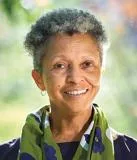
In the year since Dobbs was handed down, many in the NYU Law community have worked to navigate this new legal landscape. Through litigation, advocacy, and network-building, a number of alumni have helped to maintain reproductive healthcare for millions of Americans immediately affected by the decision. In the clinic, students have provided research into the many legal dimensions that have made poor and marginalized people more vulnerable to a new loss of care. And in groundbreaking legal scholarship, faculty members such as Melissa Murray, Frederick I. and Grace Stokes Professor of Law, and Peggy Cooper Davis, John S. R. Shad Professor of Lawyering and Ethics, are working to frame a new understanding of reproductive health.
A Troubled History
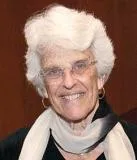
NYU Law alumni have been active in battles to secure reproductive rights for decades. Nancy Stearns ’67 was the first lawyer in the United States to challenge a state’s abortion law on the basis of women’s constitutional right to liberty and equal protection and not on the basis of doctors’ right to perform abortions. The class action she filed in New York in 1969, Abramowicz v. Lefkowitz, was also the first in which women challenged laws criminalizing abortion as plaintiffs and testified about how they were affected by laws restricting their access to abortion. After a change in New York abortion law made the case moot, Stearns brought similar cases that overturned antiabortion laws in New Jersey, Connecticut, and Rhode Island, and she helped other lawyers successfully challenge similar laws in Massachusetts and Pennsylvania. Stearns’s trailblazing work was cited in Roe.
But since Roe, notes Stearns, reproductive rights have been eroding. She cites rulings and provisions—going back as far as the 1976 Hyde Amendment’s limitations on the use of federal funds for abortions—that have curtailed rights or made abortions more difficult for many Americans to access, particularly poor women and women of color.

Another generation of NYU Law alumni has taken up the mantle. In 2017, Travis “TJ” Tu ’03, then a partner at Patterson Belknap Webb & Tyler who handled intellectual property and consumer protection matters, felt troubled by the political landscape following the 2016 election, and decided to join the Center for Reproductive Rights as senior counsel. Tu was co-lead counsel for medical providers in the 2020 Supreme Court case June Medical Services v. Russo, which overturned a Louisiana law that required doctors who performed abortions to have admitting privileges at a hospital within 30 miles of an abortion clinic.
The Center for Reproductive Rights, where Tu is now general counsel, represented Jackson Women’s Health Organization in the Dobbs case. Like most organizations working in reproductive rights, says Tu, the lawyers at the center knew that if Roe was overturned, state constitutions and courts would become the new battleground for advocacy and litigation work. When Dobbs became final in June 2022, the center immediately launched a wave of litigation designed to forestall state abortion “trigger bans,” laws outlawing abortion that were set to go into immediate effect if the federal right were to be overturned. The center, alongside its partners, went to court in multiple states within a week of the decision, including Oklahoma, Mississippi, Arizona, and Texas.
“When it comes to access to reproductive health care, especially abortion care, every day counts,” Tu says.
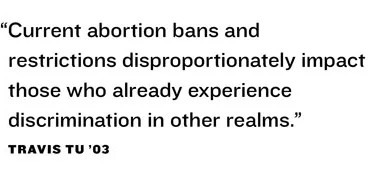
The center is also working with the Biden administration to try to pass the Women’s Health Protection Act. Introduced in the House of Representatives in March 2023, the act would not only enshrine the right to abortion at the federal level, but would include stronger protections than Roe did, says Tu. “Current abortion bans and restrictions disproportionately impact those who already experience discrimination in other realms, including women, LGBTQ people, people of color, people with disabilities, immigrants, and more,” says Tu. “New legislation must take protection of these most vulnerable groups into account.”

As senior counsel at the Center for Reproductive Rights, Stephanie Toti ’03 successfully argued the 2016 Supreme Court case Whole Woman’s Health v. Hellerstedt, which concerned a Texas law that, like the Louisiana law in Tu’s later case, placed unconstitutionally restrictive requirements on doctors who performed abortions. In 2017, Toti founded the Lawyering Project, an abortion rights litigation and advocacy organization where she serves as senior counsel and project director [see “A Leader in Reproductive Rights”].
In the wake of Dobbs, Toti says, it was important to draw together lawyers involved in reproductive care to pool expertise and offer a place for doctors, pregnant people, and activists to ask questions or receive legal counsel or representation. Toti helped spearhead the creation of the nationwide Abortion Defense Network, a collaboration between private firms, nonprofit organizations, and some government officials committed to protecting reproductive rights. The network is managed by the Lawyering Project.
“Its goal is to ensure that everyone working in the field of abortion care has access to a values-aligned lawyer who can help them understand their rights, and should they face the threat of civil or criminal liability, help to defend them in court,” Toti says. Its partners include advocacy organizations like the Center for Reproductive Rights, If/When/How, the American Civil Liberties Union (ACLU), and private firms like Paul, Weiss, Rifkind, Wharton & Garrison and Hogan Lovells.
A New Landscape

At the ACLU, several NYU Law alumni are working together on the various interlocking legal issues spawned by Dobbs. For two decades, Jennifer Dalven ’95 has directed the organization’s Reproductive Freedom Project, where Andrew Beck ’07 and Julia Kaye ’13 are senior staff attorneys and Ryan Mendías ’19 is a staff attorney. Anjana Samant ’01, a senior staff attorney at the Women’s Rights Project, has previously worked on litigation regarding unlawful prison conditions for incarcerated women and has advocated for policies to keep families together in the child welfare system—two issues, she says, that are deeply affected by a woman’s ability to terminate a pregnancy. Lauren Johnson ’12, who has spent over a decade as a criminal defense advocate, is the director of the ACLU’s newly created Abortion Criminal Defense Initiative.

Samant views Dobbs as a political decision, and argues that part of the solution will therefore need to be political, including electing officials who support reproductive rights and passing state and federal measures to protect rights. “The 2022 midterm elections reveal how important an issue abortion rights is to Americans,” she says. In 2022, the ACLU worked with other advocates on ballot measures related to abortion in six states. In each state, the people voted to protect abortion rights.
Samant also points to the 2023 Wisconsin Supreme Court elections, which added a progressive judge to the court and flipped its ideological balance. The race had one of the largest turnouts fora Wisconsin Supreme Court election in the state’s history. “This clearly reflected the importance of abortion rights and ensuring that Wisconsin’s laws were interpreted to protect reproductive freedom, not undercut it,” she says.
While Dalven also sees causes for optimism, she notes that Dobbs’s impact can’t be overstated. “The bottom line is that people’s lives will be irrevocably altered, and some will even die because of this decision,” she says.
Though the Supreme Court majority said that Dobbs would act as the final settlement in the abortion debate, says Samant, a number of cases have been brought across the country in an attempt to end abortion rights not just within particular states, but across the United States. Dalven points to a case filed in November 2022 in Texas, where a federal judge ruled to revoke the Federal Drug Administration’s approval of mifepristone, the first in a two-drug regimen used in more than 50 percent of all abortions in the United States. The decision would affect the availability of the drug for millions of Americans throughout the country, even in states where abortion is legal. While the US Supreme Court blocked the district court’s ruling from taking effect while an appeal is pending, many, including Dalven, expect the case will soon be heard by the Court.
The Dobbs decision also allowed states to criminalize abortion, leaving health care providers and those who aid people in accessing abortion care—and in some instances patients themselves—liable to prosecution as well as civil suits. Since Dobbs, more than a dozen states have made it a criminal offense to perform an abortion, with some states carrying penalties as severe as life imprisonment. In several states, legislatures have passed an abortion ban at six weeks, when many people would not yet know they are pregnant, Johnson says.
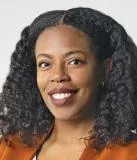
The ACLU’s new Abortion Criminal Defense Initiative is building and working alongside a network of defense attorneys to represent and advise individuals who face possible criminal prosecution and investigation. Among its partner organizations is Toti’s Abortion Defense Network. As director of the initiative, Johnson says that her position allows her to continue her career-long fight advocating against the harms of the criminal legal system, especially to those who are most marginalized. Before joining the ACLU, she served as senior litigation counsel for the NAACP’s Legal Defense and Educational Fund, where she worked to challenge injustices within the criminal legal system, as well as a staff trial attorney at the Public Defender Service for the District of Columbia.
“Black and brown folks are disproportionately harmed by our criminal legal system, and face high barriers to abortion access; the criminalization of access to this critical health care brings even greater harm for these communities,” says Johnson. Dalven says that though the overturning of Roe and the criminalization of abortion care in much of the country is an enormous setback, she feels encouraged by the energy, creativity, and organizing power she’s seen among the next generation of advocates. “[They] won’t sit quietly as their rights are stripped away,” Dalven says. “We see that in the LGBTQ space, we see that in the environmental space, and we are increasingly seeing that in the area of reproductive justice.”
Preparing the Next Generation

NYU Law’s Reproductive Justice Clinic was the deciding factor for Leora Einleger ’24 when she was applying to law schools. “Not all law schools had the resources, professors, courses, and clinics dedicated to [reproductive rights] like NYU Law,” says Einleger, who is co-president of the Law School’s chapter of If/When/How, a reproductive justice law and policy nonprofit that has student-led chapters around the country.
She says that the clinic helped her to understand that the status of reproductive rights—generally understood to mean the right to an abortion—has legal implications far beyond the ability to obtain an abortion. Reproductive justice, the term that the clinic uses to describe its own efforts, includes other factors, such as economic disparities or lack of adequate health services, that impact reproductive autonomy and outcomes. “We embraced the term ‘reproductive justice’ in our clinic name because we are guided by the broader values, principles, and goals articulated by the Reproductive Justice Movement, led by women of color,” explains Sarah Burns.
After taking the clinic, Einleger, an Honorable Anthony P. Savarese Scholar, is now interested in, among other things, pursuing a career in family defense. “I think Dobbs made people think, ‘If this isn’t a fundamental right, then what other liberties are unprotected?’” Einleger says. “In the clinic, I’ve been able to see how family defense issues, surveillance of families, the right to not have a child, also the right to have a child in a safe and healthy way—all of these issues are impacted by any law that impacts reproductive autonomy.”
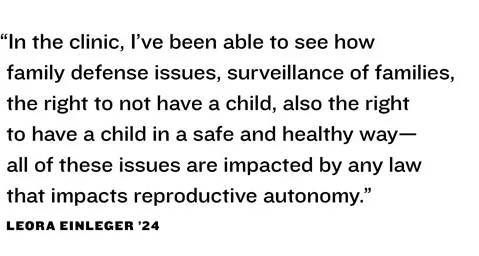
In the last year, students in the clinic have drafted model motions to suppress evidence collected from a pregnant person during prenatal care that could be used in child welfare or criminal proceedings; they worked on strategies to develop a pilot program for a clinic administering misoprostol, which is the second medication in the two-drug treatment used in self-managed abortions and which has been used in other countries to regulate reproduction; and they have provided research to challenge laws that punish pregnant people for alleged controlled substance use.

“One thing that’s been interesting about being in the clinic this year is that I do feel as though there is opportunity for a lot more creativity, which I guess comes from the foundation and the groundwork being taken out from under you,” says Isabel Gutenplan, who says she plans to work after graduation for a law firm that has made a commitment to reproductive justice through its pro bono efforts.
Gutenplan, a Stuart Coleman and Meryl Rosofsky Scholar, also points to her Constitutional Law course, taught by Melissa Murray, as having a profound impact on her professional aspirations. “[In the course], Murray centered a lot of issues [of due process and equal protection doctrine] in reproductive rights and reproductive justice principles,” says Gutenplan. A year after taking her Constitutional Law exam with the Dobbs decision looming, Gutenplan is looking to the future. “I’m cautiously optimistic that rights will be built back,” she says. “And I’m hopeful that when they are, this provides an opportunity for us to do so in a way that considers and takes into account access and equity and community. We’ve already started to see that in the way that the clinic is talking and brainstorming, and I [hope] that this could provide a bit of a window for some better change.”
Looking Ahead
A Q&A with Melissa Murray
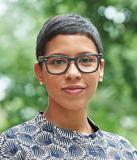
Frederick I. and Grace Stokes Professor of Law Melissa Murray is a leading scholar in constitutional law and reproductive rights and justice. She serves as the faculty director of the Birnbaum Women’s Leadership Center, a co-host of the award-winning Supreme Court podcast Strict Scrutiny, and a regular commentator for MSNBC. Recently, she has published articles on the legal frontier post-Dobbs, the equal protection arguments in and outside the abortion context, and the eugenics claims asserted against reproductive rights.
In an amicus brief you co-filed in Dobbs, you make a case that the right to an abortion should be protected under the Equal Protections Clause of the 14th Amendment, which, among other things, has been used to prevent sex-based discrimination. Can you explain your argument?
In the brief, co-authored with Reva Siegel at Yale Law School and Serena Mayeri at the University of Pennsylvania Carey Law School, we argue that the 14th Amendment’s Equal Protection Clause, as much as its Due Process Clause [the basis of the Roe decision], provides firm footing for the right to an abortion. And I think the Court majority in Dobbs gives both of these constitutional provisions short shrift. Our colleague Peggy Cooper Davis [John S. R. Shad Professor of Lawyering and Ethics] has already written beautifully about why the Due Process Clause of the 14th Amendment provides a textual home for a right to an abortion because it is rooted in an abolitionist ethic that was aimed at not only eliminating slavery, but eliminating the vestiges of slavery. Among those vestiges that the framers of the 14th Amendment understood to distinguish liberty from enslavement was control over reproductive capacity.
We make a corollary case that in addition to the due process guarantee of liberty, the 14th Amendment also has an abolitionist interest in furthering equality—a point that the suffragists emphasized as they articulated their support for the 14th Amendment. Control over reproductive capacity is absolutely essential to women’s equality. And if you think about abortion as a species of sex based discrimination, and it is because it is aimed principally at women, the interest in regulating abortion was, in part, about forcing women to adopt a particular persona—that of wife and mother. So, these 19th-century antiabortion laws [that are the predecessors of contemporary bans] were rooted in a kind of sex-based stereotype, and we should understand them as forms of sex-based discrimination.
The Dobbs majority breezily dismissed an equal protection rationale for abortion rights. However, since Dobbs, there has been a lot of state-based litigation invoking the Equal Protection Clause, and we are finding that our arguments are having a second life outside of the federal courts in these state courts. While there’s certainly room to think about equality-based arguments for reproductive rights on the federal level, it’s really encouraging to see these arguments being deployed in other litigation around the country.
What other rights does Dobbs seem to leave vulnerable?
The Dobbs decision has really made clear how precarious reproductive freedom is in this country, just as a general matter. This fight isn’t about returning abortion decisions to the states. It’s about eliminating access to abortion. Full stop. And already we’re seeing how that is happening. For example, in the mifepristone case, but also in a more anodyne torts case in Texas where a former husband is suing his ex-wife’s friends for providing her with information about and the tools to perform a self-induced medication abortion. He’s suing under Texas’s wrongful death statute. That’s meaningful. When you file a wrongful death lawsuit to vindicate a terminated fetus, you’re essentially arguing that the fetus is a person and the abortion is a wrongful death. This is a backdoor way into fetal personhood claims.
As far as other rights, in Dobbs, the Court suggests that any unenumerated constitutional right is threatened because there’s no textual support for it. The Court also suggests that stare decisis is less forceful in circumstances where an earlier decision disrupted ongoing democratic deliberation on an issue of tremendous public salience. In Dobbs, the Court says that Roe was profoundly wrong because it interrupted state-level democratic deliberation of the abortion question and imposed the Court’s own judicial resolution of the issue. If you take that logic seriously and you consider what other precedents have similarly disrupted ongoing state-level democratic deliberation of a contentious issue, the one that comes to mind almost immediately is Obergefell v. Hodges, which legalized same-sex marriage in 2015. Obergefell was decided in a moment of undeniable churn in state marriage laws. And the Court stepped into that ongoing debate to render a decision that legalized same-sex marriage across the country. Just taking the reasoning of Dobbs to its logical conclusion, it seems very likely that Obergefell is another precedent that could be subject to the same critiques as Roe.
What issues post-Dobbs are you focusing on now?
Kate Shaw, a professor at Cardozo School of Law and my co-host on Strict Scrutiny, and I have a piece forthcoming in the Harvard Law Review called “Dobbs and Democracy.” We take on this question that the Dobbs decision put out there in which the majority says they are returning the abortion question to the people. We attack this first premise, that Roe disrupted democratic debate. But even leaving that to the side, the idea that the Court is giving this question back to the people is pure gaslighting because the Court has completely distorted the electoral landscape [by weakening the Voting Rights Act and allowing aggressive gerrymandering].It’s giving this issue back to the people at precisely the time that it has made it harder for the people to register their preferences in a way that is meaningful and transparent. Put simply, this Court announced Dobbs on the heels of a raft of decisions that actually make this country less democratic.
Alana Grambush is a writer at NYU Law. Photo credits: Jay Malin (Murray); The Center for Reproductive Rights (Tu); ACLU/Molly Kaplan (Dalton); Amelia Arnold (Samant). Posted September 11, 2023

